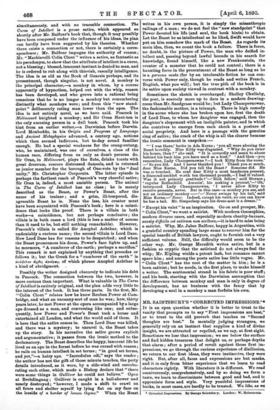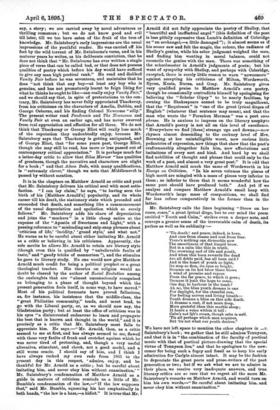MR. SAINTSBURY'S "CORRECTED IMPRESSIONS." IT is an open question whether
it is better to trust to the vanity that prompts us to say "First impressions are beat," or to trust to the old proverb that teaches us "Second thoughts are best." In mentally judging strangers, we generally rely on an instinct that supplies a kind of divine insight, we are attracted or repelled, as we say, at first sight. Sometimes we lose that impression ; we see below the surface and find hidden treasures that delight us, or perhaps depths that alarm ; after a period of revolt against those first im- pressions, we go through the curious experience of disillusion, we return to our first ideas, they were instinctive, they were right. But, after all, faces and expressions are but masks, and it is only from bitter experience that we learn to read characters rightly. With literature it is different. We read omnivorously, comprehensively, and by so doing we form a taste, we learn to discriminate between good and bad, and tc appreciate form and style. -Very youthful impressions oi books, in most cases, are hardly to be trusted. We like, as we • Corrected Impreviorts. By George Saintsbu7. London: W. Heinezusnu. say, a story ; we are carried away by novel adventures or thrilling romances ; but we do not know good and evil till later, till we too have eaten of the fruit of the tree of knowledge. Mr. Saintsbury's early impressions are the usual impressions of the youthful reader. He was carried off his feet by the wild torrent of Mr. Swinburne's verse, and in his maturer years he writes, as his deliberate conviction, that he does not think that "Mr. Swinburne has ever written a single
piece of verse that can be called bad, or that does not possess qualities of poetry which before his day would have sufficed to give any man high poetical rank." He read and disliked
Vanity Fair before he was seventeen, and maintains that he does "not think that any boy—at least any boy who is genuine, and has not prematurely learnt to feign liking for what he thinks he ought to like—can really enjoy Vanity Fair," and we should say that, in spite of protestations to the con- trary, Mr. Saintsbury has never fully appreciated Thackeray, from his criticisms on the characters of Amelia, Dobbin, and George Osborne, and his finding Colonel Newcome "silly." The present writer read Pendennis and The Newcomes and Vanity Pair at even an earlier age, and has never swerved from real appreciation and affection for all three. We do not think that Thackeray or George Eliot will really lose much of the reputation they undoubtedly enjoy, because Mr. Saintsbury says that Thackeray is getting antiquated, and of George Eliot, that "for some years past, George Eliot, though she may still be read, has more or less passed out of contemporary critical appreciation." It is perhaps much for a latter-day critic to allow that Silas Hamer "has qualities of greatness, though the narrative and characters are slight for a book ; " and that Adam Bede, with many qualifications, is "extremely clever," though we note that Middlemarch is passed by without mention.
It is in the chapters on Matthew Arnold as critic and poet that Mr. Saintsbury delivers his critical soul with most satis- faction. "I can lay claim," he says, "to having seen the birth of his [Matthew Arnold's] popularity, and its whole career till his death, the stationary state which preceded and succeeded that death, and something like a commencement of the usual depreciation and spoliation which so surely follows." Mr. Saintsbury adds his share of depreciation and joins the " mockers " in a little cheap satire at the expense of the "Apostle of Sweetness and Light," with a passing reference to "misleading and snip-snap phrases about 'criticism of life,' 'lucidity,"grand style,' and what not." He warns us to be careful about either imitating Mr. Arnold as a critic or believing in his criticisms. Apparently, the sole merits he allows Mr. Arnold to retain are literary style (though even this is qualified by "unbelievable faults of taste," and "gaudy tricks of mannerism "), and the stimulus he gave to literary study. No one would now give Matthew Arnold much credit for being a political prophet or a great theological teacher. His theories on religion would no doubt be classed by the author of Social Evolution among the onslaughts that are "almost unconsciously recognised as belonging to a phase of thought beyond which the present generation feels itself, in some way, to have moved." Most of his political forecasts have proved fallacious, as, for instance, his insistence that the middle-class, the "great Philistine community," tends, and must tend, to go with the Liberal party, or, as we should now say, the Gladstonian party ; but at least the office of criticism was in his eyes "a disinterested endeavour to learn and propagate the beat that is known and thought in the world," and it is precisely as a critic that Mr. Saintsbury most fails to appreciate him. He says :—" Mr. Arnold, then, as a critic seemed to me at first, and has always seemed to me, flawed with these very faults of freak and crotchet against which he was never tired of protesting, and, though a very useful alterative, stimulant, and check, not a good model, and a still worse oracle. I should say of him, and I think I have always reeked my own rede from 1865 to the present day in this respect, admire, enjoy, and be thankful for Mr. Arnold as a critic ; but be careful about imitating him, and never obey him without examination.'" Mr. Saintsbury's condemnation of Matthew Arnold as a guide in matters of criticism reminds us a little of Mr. Bumble's condemnation of the law,—" If the law supposes that," said Mr. Bumble, squeezing his hat emphatically in both hands, "the law is a hass,—a hidiot." It is true that Mr.
Arnold did not fully appreciate the poetry of Shelley, that "beautiful and ineffectual angel" (this definition of the poet is less pithily expressive than Lamb's definition of Coleridge as "an archangel,—a little damaged "); it almost seems as if
his senses saw and felt the magic, the colour, the radiance of Shelley's genius, while his sober judgment weighed the man,
and finding him wanting in moral balance, could not reconcile the genius with the man. There was something of the schoolmaster in Arnold's judgments of poets; but his want of sympathy with Shelley, and perhaps with Coleridge, excepted, there is surely little reason to warn " newcomers " against accepting his criticisms of Milton, Wordsworth, Byron, Keats, Burns, and Gray. Mr. Saintsbury gives very qualified praise to Matthew Arnold's own poetry, though he occasionally contradicts himself by apologising for believing the "Scholar Gipsy" to be nearly faultless, by owning the Shakespeare sonnet to be truly magnificent, that the " Requiescat " is "one of the great lyrical dirges of English" (whatever that sentence may mean), and that the
man who wrote the "Forsaken Merman" was a poet sans phrase. He is anxious to impress on the literary neophyte that Arnold's poetry is not all on this level of excellence. "Everywhere we find [these] strange ups and downs ;—now rhymes almost descending to the cockney level of Mrs. Browning at her unintelligible worst, now curious little pedantries of expression, now things that show that the poet's craftsmanship altogether fails him, now affectations and imitations of every sort and kind. And hard by we shall find nobilities of thought and phrase that could only be the work of a poet, and almost a very great poet." It is odd that Matthew Arnold said much the same of Wordsworth in his Essays on Criticism. "In his seven volumes the pieces of
high merit are mingled with a mass of pieces very inferior to them ; so inferior to them that it seems wonderful how the same poet should have produced both." And yet if we analyse and compare Matthew Arnold's small heap with Wordsworth's large mass of compositions, we shall find far less refuse comparatively in the former than in the latter.
Mr. Saintsbury calls the lines beginning "Strew on her roses, roses," a great lyrical dirge, but to our mind the poem entitled "Youth and Calm," strikes even a deeper note, and
conveys a greater sense of the irrevocable calm of death, its pathos as well as its sublimity :—
" 'Tis death! and peace, indeed, is here, And ease from shame and rest from fear. There's nothing can dismarble now The smoothness of that limpid brow. But is a calm like this in truth, The crowning end of life and youth, And when this boon rewards the dead Are all debts paid, has all been said ? And is the heart of youth so light. Its step so firm, its eyes so bright, Because on its hot brow there blows A wind of promise and repose From the far grave, to which it goes ; Because it bath the hope to come, One clay, to harbour in the tomb ? Ah no, the bliss youth dreams is one For daylight, for the cheerful sun, For feeling nerves and living breath— Youth dreams a bliss on this side death. It dreams a rest, if not more deep, More grateful than this marble sleep ; It hears a voice within it toll: Calm's not life's crown, though cam is well. 'Tis all perhaps which man acquires, But 'tis not what our youth desires"
We have not left space to mention the other chapters in
Saintsbury's book ; we gather that he still admires Tennyson, and that it is in "the combination of the faculty of poetical music with that of poetical picture-drawing that the special virtue of Tennyson lies," and that he apologises to the new- comer for being such a fogey and fossil as to keep his early admiration for Carlyle almost intact. It may be the fashion to depreciate the great poets and prose-writers of the past generation or two; but if we ask what we are to admire in their place, we receive very inadequate answers, and true literary critics are so rare that we regret all the more Mr.
Saintsbury's remarks on Matthew Arnold, and would turn on him his own words,—" Be careful about imitating him, and never obey him without examination."







































 Previous page
Previous page